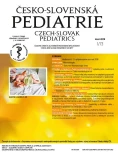Measles in childhood – experience from the outbreak in Ostrava region in 2017
Authors:
L. Petroušová 1; L. Rožnovský 1; I. Martinková 2
Authors‘ workplace:
Klinika infekčního lékařství, Fakultní nemocnice Ostrava
1; Krajská hygienická stanice Moravskoslezského kraje se sídlem v Ostravě
2
Published in:
Čes-slov Pediat 2018; 73 (1): 41-47.
Category:
Original Papers
Overview
Introduction:
The aim of the study is to determine the course and epidemiological context at children during measles outbreaks in 2017 in the Ostrava region, the Czech Republic.
Materials and methods:
The measles outbreak occurred during February and June 2017 in the Ostrava region. 38 children were hospitalized at the Clinic of Infectious Medicine at the University Hospital Ostrava. The etiology was confirmed by serological tests at 37 children (97%), the virus was detected directly by polymerase chain reaction at 9 children (24%) in addition. The genotyping confirmed the B3 virus type at The Robert Koch Institute in Berlin.
Results:
The age range of children was from 3 months to 16 years, the highest incidence was at children aged under 2 years (76%). Only 4 children were vaccinated. The children were hospitalized on average 5.4 days (3–11 days), 8 children (21%) were hospitalized in the intensive care unit. Gastroenteritis (13%) and pneumonia (10%) were the most common complications. Pneumonia was serious with the necessity of oxygen therapy. Infusion rehydration was needed in 50% of cases, antibiotics for bacterial superinfection were administered in 33% of cases. Neurological complications were not observed. No child died.
Conclusion:
Despite the possibility of prevention, measles remains a major cause of mortality and morbidity worldwide. Population coverage of vaccination over 95% is required in order to maintain a good epidemiological situation.
Key words:
epidemic, children, measles, vaccination
Sources
1. Gershon AA. Measles virus. In: Mandell GL, Bennett JE, Dolin R. Principles and Practice of Infectious Diseases. Elsevier, 2005 : 2031–2038.
2. http://www.szu.cz/uploads/Epidemiologie/2017_Spalnicky_vyznam_onemocneni_a_aktualni_situace.pdf.
3. http://www.who.int/immunization/monitoring_surveillance/burden/vpd/surveillance_type/active/measles/en/.
4. http://www.euro.who.int/en/media-centre/sections/press-releases/2017/measles-outbreaks-across-europe-threaten-progress-towards-elimination.
5. Boštíková V, Salavec M, Boštík P. Novinky ve vakcinologii – spalničky (Morbilli). Vakcinologie 2017; 11 (1): 36–40.
6. Šejda J, Vaništa J, Doutek S. Spalničky. 1. vyd. Praha: Avicenum, 1983 : 1–149.
7. https://www.cdc.gov/vaccines/pubs/pinkbook/meas.html.
8. del Buono MB, Vaschetti P, Iannicelli J, et al. Age-related loss of maternal antibodies against measles in children in La Plata. Rev Argent Microbiol 2003; 35 (2): 102–105.
9. Leuridan E, Van Damme P. Passive transmission and persistence of naturally acquired or vaccine-induced maternal antibodies against measles in newborns. Vaccine 2007; 25 (34): 6296–6304.
10. Perry RT, Halsey NA. The clinical significance of measles: a review. J Infect Dis 2004; 189 (1): 4–16.
11. Woudenberg T, van Binnendijk RS, Sanders EAM, et al. Large measles epidemic in the Netherlands, May 2013 to March 2014: changing epidemiology. Euro Surveill 2017; 22 (3): 30443. doi: 10.2807/1560-7917.ES.2017.22.3.30443.
12. Trmal J, Limberková R. Vyhodnocení epidemie spalniček v Ústeckém kraji. Epidemiol Mikrobiol Imunol 2015; 64 (3): 139–145.
13. Lagunju IA, Orimadegun AE, Oyedemi DG. Measles in Ibadan: a continuous scourge. Afr J Med Med Sci 2005; 34 (4): 383–387.
14. Magurano F, Marella GL, Marchi A, et al. A case of fulminant subacute sclerosing panencephalitis presenting with acute myoclonic-astatic epilepsy. Ann Ist Super Sanita 2017; 53 (2): 167–169.
15. Wolfson LJ, Grais RF, Luquero FJ, et al. Estimates of measles case fatality ratios: a comprehensive review of community-based studies. Int J Epidemiol 2009; 38 (1): 192–205.
16. http://www.vakcinace.eu/doporuceni-a-stanoviska.
Labels
Neonatology Paediatrics General practitioner for children and adolescentsArticle was published in
Czech-Slovak Pediatrics

2018 Issue 1
- What Effect Can Be Expected from Limosilactobacillus reuteri in Mucositis and Peri-Implantitis?
- The Importance of Limosilactobacillus reuteri in Administration to Diabetics with Gingivitis
-
All articles in this issue
- Neonatal outcomes of extremely preterm newborns in Czech Neonatal Network
- Benefit of a sustained inflation manoeuvre in postnatal stabilization of extremely preterm infants born on the threshold of viability
- Evaluating electrical cortical activity using amplitude-integrated electroencephalography in term neonates during phototheraphy
- Neonatal pneumothorax – incidence and risk factors
-
Včasná intervencia pri ochorení diabetes mellitus 1. typu z hľadiska úrovne metabolickej kompenzácie a využívania inštrumentálnej sociálnej opory
Sociálno-psychologické dôsledky včasnej intervencie u detí s diabetes mellitus 1. typu - Measles in childhood – experience from the outbreak in Ostrava region in 2017
- What disease can be hidden behind a diagnosis of erythema nodosum
- Czech-Slovak Pediatrics
- Journal archive
- Current issue
- About the journal
Most read in this issue
- What disease can be hidden behind a diagnosis of erythema nodosum
- Neonatal pneumothorax – incidence and risk factors
- Neonatal outcomes of extremely preterm newborns in Czech Neonatal Network
- Measles in childhood – experience from the outbreak in Ostrava region in 2017
